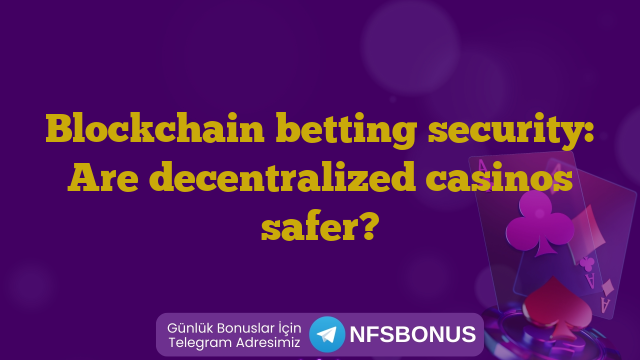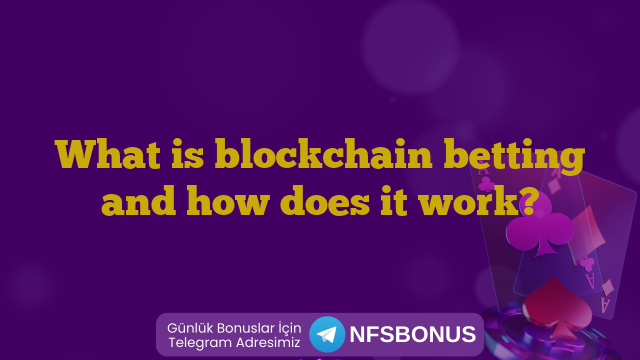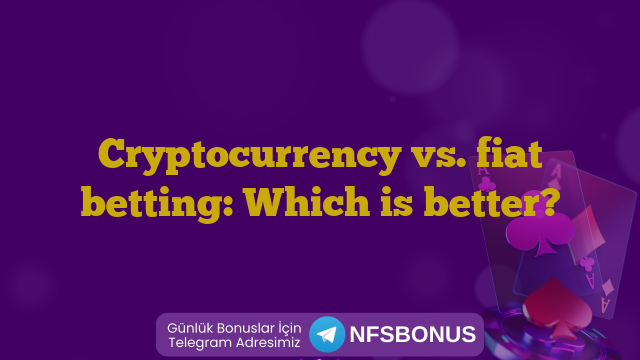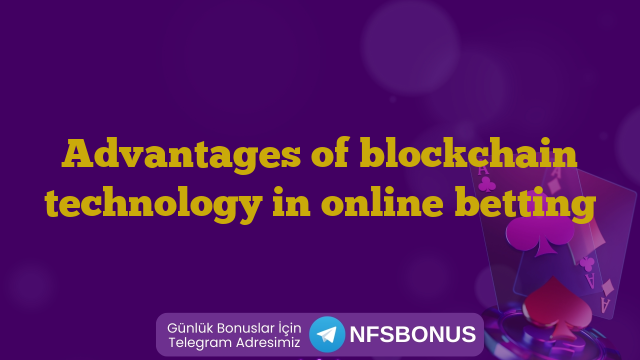In the rapidly evolving world of online gambling, the rise of blockchain technology has sparked a significant shift in how players perceive security and privacy. With concerns about data breaches and fairness prevalent in traditional casino environments, many are now turning to decentralized casinos for a safer betting experience. This article explores the realm of blockchain betting security, examining whether decentralized platforms truly offer enhanced protection for users. From the fundamentals of blockchain technology to the intricate workings of smart contracts, we’ll uncover the advantages and potential risks associated with this revolutionary approach to gambling. Join us as we delve into real user experiences and future trends that could redefine betting security in the digital age.
Understanding Blockchain Betting: A Quick Overview
Blockchain betting refers to the use of blockchain technology in online gambling and wagering activities. Unlike traditional betting platforms, which often rely on central authorities to manage transactions and ensure fairness, blockchain betting leverages decentralized networks to enhance transparency and security. Here’s a closer look at the key components and functionalities involved in this innovative betting approach:
1. Transparency: Transactions on a blockchain are publicly recorded and immutable, which means players can verify the fairness of game outcomes and ensure that bets are processed accurately without manipulation.
2. Decentralization: By eliminating the need for a central authority, blockchain betting platforms distribute control among users. This reduces the risks usually associated with traditional casinos, such as fraud or bankruptcy of the operator.
3. Cryptocurrency Usage: Most blockchain betting platforms accept cryptocurrencies, allowing for quicker transactions and reduced fees. Players can often deposit and withdraw funds in real-time, enhancing their gaming experience.
4. Enhanced Security: The cryptographic principles that underpin blockchain technology ensure that user data and funds are secured against hacking and cyber threats, making blockchain betting a more secure alternative.
5. Global Accessibility: Because blockchain betting platforms operate on decentralized networks, users can access these services from anywhere in the world, bypassing regional restrictions and limitations imposed by some traditional gambling operators.
This overview lays the groundwork for understanding why blockchain betting is gaining traction among players who prioritize privacy, security, and fair play.
How Decentralized Casinos Enhance User Privacy and Security
Decentralized casinos are revolutionizing the gaming experience, primarily by increasing user privacy and security. In traditional online casinos, players often have to provide personal and financial information, which creates a vulnerability to data breaches and identity theft. However, with blockchain betting, users can engage in gambling activities while maintaining anonymity.
Decentralized platforms leverage blockchain technology, which operates on a peer-to-peer network. This means there is no central authority that holds user data, significantly reducing the risks associated with centralized data storage. Since every transaction made in a decentralized casino is recorded on the blockchain, players can enjoy transparency regarding the fairness and integrity of the games they play.
Furthermore, blockchain betting ensures that players’ funds are secured through cryptographic techniques. This makes it nearly impossible for hackers to manipulate or access players’ funds. The use of public and private keys adds an additional layer of security, as players control their wallets without needing to trust a third party.
Moreover, decentralized casinos often employ advanced encryption technologies to safeguard personal data and transactions. This not only protects against unauthorized access but also enhances the overall user experience by promoting trust and confidence in the platform’s security measures.
Decentralized casinos enhance user privacy and security through the implementation of blockchain technology, ensuring that players can enjoy a safer gambling environment while engaging in blockchain betting.
The Role of Smart Contracts in Blockchain Betting
Smart contracts are a foundational element of Blockchain betting that significantly enhance security and transparency. These self-executing contracts with the terms of the agreement directly written into code facilitate automated processes without the need for intermediaries, thus reducing potential points of failure or fraud.
In the context of decentralized casinos, smart contracts serve several critical functions:
- Automation of Bets: Smart contracts automate the betting process, ensuring that payouts are triggered based on predefined conditions. This means players can trust that they will receive their winnings without delay or manipulation.
- Transparency: All transactions and rules of engagement are recorded on the blockchain, providing a transparent and immutable record of every bet made. Players can verify these records, fostering confidence in the casino’s operations.
- Security: By eliminating centralized control, smart contracts reduce the risk of hacks or fraud that are more prevalent in traditional casinos. The decentralized nature makes it much harder for malicious actors to tamper with systems.
- Fairness: Many decentralized casinos utilize provably fair algorithms, ensuring that the games cannot be manipulated by either the house or the players. Smart contracts facilitate these verifiable mechanisms that reinforce fairness.
As the Blockchain betting landscape continues to evolve, the effectiveness of smart contracts in enhancing user experience and security will likely drive the next wave of innovation in this space. Their role in ensuring fair play and secure transactions will be integral to the growth of decentralized casinos.
Comparing Traditional Casinos and Blockchain Betting Security
When evaluating the security of traditional casinos versus blockchain betting, several key differences emerge that can significantly impact player safety and trust.
Traditional casinos, whether physical or online, often rely on centralized systems. This means that sensitive information, such as player data and financial transactions, is controlled by a single entity. While reputable casinos implement robust security measures, they remain vulnerable to breaches, fraud, and operational malpractices due to centralization. Moreover, players face the risk of loss of funds due to potential inadequacies in business practices or regulatory failings.
In contrast, blockchain betting platforms utilize decentralized networks that provide numerous advantages in terms of security. Here are some fundamental differences:
While traditional casinos have established systems that can be trusted under regulated environments, blockchain betting offers innovative solutions that enhance security and provide a level of protection and transparency that players may find more appealing. This evolving landscape suggests an urgent need for traditional operators to adapt and enhance their security measures to stay relevant in an increasingly decentralized world.
Key Benefits of Blockchain Betting for Players
In the rapidly evolving landscape of online gaming, blockchain betting has emerged as a transformative force, offering numerous advantages for players. Here are some of the key benefits that make it an appealing choice for many enthusiasts:
- Increased Transparency: One of the fundamental features of blockchain technology is its transparency. Every transaction is recorded on the blockchain, allowing players to verify outcomes and ensure fairness without relying on the casino’s word alone.
- Lower Fees: Traditional online casinos typically charge high fees for transactions, but decentralized platforms often feature lower costs. By eliminating intermediaries, players can keep more of their winnings.
- Instant Payouts: With the use of cryptocurrencies in blockchain betting, players can often enjoy instant payouts. Unlike traditional methods that can take days, blockchain transactions are processed quickly, enhancing the overall user experience.
- Global Accessibility: Decentralized casinos operate on a global scale, providing access to users from various regions without the constraints posed by traditional gambling regulations.
- Enhanced Security: As discussed in earlier sections, the inherent security features of blockchain technology safeguard user data and funds against hacks and frauds, offering players peace of mind.
- Provably Fair Gaming: Many decentralised casinos utilize algorithms that allow players to confirm the randomness and fairness of games, providing an added layer of trust that is not always present in traditional gaming platforms.
- Privacy Control: Players have greater control over their personal information in blockchain betting environments, as transactions can be conducted anonymously, reducing the risk of data breaches.
The benefits of blockchain betting are reshaping how players engage with online casinos, providing a more secure, transparent, and user-friendly experience that traditional platforms struggle to match. As the industry continues to innovate, these advantages are likely to attract even more players, propelling the growth of decentralized gaming.
Potential Risks Associated with Decentralized Casino Platforms
While blockchain betting offers enhanced security and privacy features, it is not without its risks. Understanding these potential pitfalls is crucial for players looking to engage with decentralized casino platforms. Here are some of the main risks associated with decentralized casinos:
1. Regulatory Uncertainty: The decentralized nature of these platforms often places them in a legal gray area. Different jurisdictions have varying laws regarding online gambling, which can affect the legality and safety of players’ funds.
2. Smart Contract Vulnerabilities: Although smart contracts automate transactions and enforce rules, they are not immune to bugs or glitches. A flaw in the code can lead to significant financial losses for users, as these errors may be exploited by malicious actors.
3. Lack of Customer Support: Unlike traditional casinos, decentralized platforms may not offer robust customer support. This can make it difficult for players to resolve disputes or retrieve lost funds, especially in cases of malfunction or miscommunication.
4. Difficulty in Assessing Platform Credibility: With many decentralized casinos available, players may struggle to determine which platforms are trustworthy. Poorly designed websites or lack of transparency can cloud a player’s judgment, leading them to engage with unproven services.
5. Potential for Scams and Fraud: The anonymity afforded by blockchain technology can attract scammers. Players need to be cautious and conduct thorough research before participating in new or lesser-known platforms.
6. Price Volatility of Cryptocurrencies: Many decentralized casinos operate with cryptocurrencies, which are often subject to price fluctuations. This volatility can impact the value of players’ bankrolls and may lead to unexpected losses.
While blockchain betting presents an innovative alternative to traditional gambling experiences, players must remain vigilant and aware of these potential risks when engaging with decentralized casino platforms.
User Experiences: Real Stories from Blockchain Betting Enthusiasts
The rise of Blockchain betting has transformed the gambling landscape, attracting a growing number of enthusiasts who are eager to share their experiences. Here are some compelling stories from players who have ventured into the world of decentralized casinos.
One player, Alex, recounted his first experience with a decentralized casino. He was initially skeptical about the concept but decided to try it out after learning about enhanced security features. I was amazed at how transparent everything was, he noted. The smart contracts ensured that my bets were processed automatically and fairly. I felt more in control than ever before. This sentiment resonates with many users who appreciate the autonomy that Blockchain betting provides.
Another player, Maria, shared a different perspective. Having faced issues with traditional online casinos regarding slow payments and hidden fees, she found solace in decentralized platforms. No more waiting days for withdrawals! With Blockchain betting, my funds are accessible almost instantly, and I never have to worry about unexpected charges, she explained. This speed and transparency have won over many gamblers seeking a more user-friendly experience.
Moreover, some players have highlighted the privacy aspect of using decentralized casinos. James, a regular Blockchain betting user, emphasizes the anonymity that decentralized platforms provide. I love being able to bet without having to submit a ton of personal information. It just feels safer not having my data out there, he remarked, showcasing a growing concern among players about personal data security in traditional betting environments.
The community aspect of decentralized casinos cannot be overlooked. Many players, like Sarah, appreciate the social interaction that often comes with these platforms. I found a community of like-minded individuals who share tips and strategies. It’s like having a support group, she said, illustrating how Blockchain betting is not just about financial gains, but also about building relationships among players.
These stories reflect a common theme among blockchain betting enthusiasts: they value security, autonomy, and community. As more players share their experiences, the popularity of decentralized casinos is likely to soar, offering a new frontier for betting enthusiasts around the globe.
Future Trends in Blockchain Betting Security Solutions
The world of Blockchain betting is continuously evolving, with numerous advancements aimed at enhancing security and user experience. As decentralized technology becomes more integrated into the gambling sector, several trends are emerging that promise to revolutionize how security is managed in this space.
One notable trend is the increased use of advanced encryption methods. As hackers become more sophisticated, decentralized casinos are adopting enhanced cryptographic protocols to protect user data and funds. This ensures that only authorized users can access their accounts and sensitive information remains safe.
Another significant development is the implementation of more robust identity verification systems. Utilizing decentralized identifiers (DIDs) will allow users to verify their identities without compromising their privacy. This trend will help combat fraud while ensuring that platforms adhere to regulatory standards, enhancing the overall integrity of Blockchain betting.
In addition, the integration of artificial intelligence (AI) and machine learning is set to play a crucial role in risk assessment and fraud detection. These technologies can analyze patterns and transactions in real-time, enabling decentralized casinos to identify suspicious activities and respond promptly, thus improving overall security measures.
Moreover, cross-chain compatibility is becoming more prominent, allowing decentralized casinos to operate seamlessly across different blockchain networks. This will provide greater security and reduce the risk of vulnerabilities associated with single blockchain ecosystems, ultimately benefiting users in terms of security and flexibility.
As the regulatory landscape evolves, blockchain-based platforms will likely adopt more compliance-oriented security measures. This will ensure that decentralized casinos not only offer security but do so within legal frameworks, encouraging wider acceptance by players and regulators alike.
These evolving trends in Blockchain betting security solutions are paving the way for an even safer and more transparent gambling experience, ensuring that users can engage with confidence in decentralized casinos.





